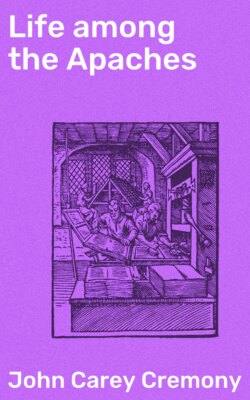Читать книгу Life among the Apaches - John Carey Cremony - Страница 31
На сайте Литреса книга снята с продажи.
Оглавление
CHAPTER I.
Table of Contents
Comanche Raid.—Detailed to send them away.—Interview with Janamata.—Description of the Chief.
My first business acquaintance with "Lo" occurred in the year 1847. A band of about one hundred Comanche warriors, led by a chief named Janamata, or the "Red Buffalo," taking advantage of the subdued and defenceless condition of the Mexicans, crossed the Rio Grande, about seventy miles below Old Reynosa, and commenced a series of depredations. Information was immediately given to the American officer commanding at that post, and the writer was detailed, with a force of fifty men, to drive off the invaders, with orders not to engage in hostilities, unless the Indians proved refractory and deaf to all other appeals.
After marching fifty miles, which was accomplished in two days, we arrived at the scene of operations, meeting the Comanches on the highway. Our force was immediately disposed to the best advantage, and placing a white handkerchief on the point of my sabre, I advanced alone toward the chief, who, leaving his warriors, rode forward to meet me. He spoke Spanish fluently, having evidently acquired it in his many marauding excursions into Mexico. Having met, I offered him a cigarito, which was accepted with Indian stoicism. We smoked in perfect silence for half a minute, when the cigaritos having been consumed the following dialogue took place:
Officer.—"I am sent to tell you, that you must recross the Rio Grande with your warriors, and come here no more to molest these people while we remain in the country."
Indian.—"I hear your words. They are not pleasant. These Mexicans are our natural enemies; we have warred against them for many years. They are also your enemies. You are killing them in their own country, the same as I am. The Comanches are friends to the Americans. Why do you prevent your friends from hunting your enemies and theirs?"
Officer.—"Red man, you mistake. These people were our enemies, but they have yielded, and all who have submitted are under our protection. "We have ceased from doing them harm, and if we permit you to injure them after we have disarmed them, it would be the same as if we did so ourselves."
Indian.—"But your revenge is for yourselves. It does not satisfy us for the blood of Comanches slain by Mexicans. You made war upon them without our consent or knowledge. We do the same. A wise warrior takes advantage of his enemy's weakness. It is now our opportunity."
Officer.—"These people are our captives, and cannot continue to be your enemies while in that condition. Suppose you had a dozen Apache captives, would you permit the Kaddos to come into your camp and kill them; take their property and go off without resistance?"
Indian.—"White man, your tongue is double, like a woman's; but the Comanche does not feel to war against his American brothers. I and my people will recross the Rio Grande, but will not promise never to come back. Good-by."
Our colloquy ended we smoked another cigarito; he waved his hand to his warriors, and without another word directed his course to the river, which was soon waded, and Janamata, with his followers, stood on American soil. This little interview imparted the knowledge that the American savages are rather keen logicians, from their own uncivilized stand-point, as they are incapable of appreciating the moral and religious sensibilities of enlightened races.
Janamata was a good type of his tribe, in point of physical development. He was about five feet ten inches in height, with well proportioned shoulders, very deep chest, and long, thin, but muscular arms. His forehead, was very broad and moderately high, his mouth enormous, and garnished with strong white teeth. His nose was of the Roman order, broad and with much expanded nostrils, which appeared to pulsate with every emotion; but his countenance was rigid and immovable as bronze. His arms consisted of a bow and quiver full of arrows, a long lance, a long sharp knife, worn in the top of his moccasin boot, and a very good Colt's revolver. A strong shield of triple buffalo bide, ornamented with brass studs, hung from his saddle bow, and his dress was composed of buckskin and buffalo hide well tanned and flexible, but wholly free from ornament. I afterwards learned from a Texas Ranger that he was called Janamata, or the "Red Buffalo," from a desperate encounter he once had with one of those animals, which had ripped up his horse, and attacked him on foot. In this encounter Janamata had only his knife to depend on, as he had lost lance and bow when unhorsed. It is related that as the buffalo charged upon him, he sprang over the animal's lowered front, and landing on his back, plunged his knife several times into its body; then, as suddenly jumping off behind, he seized it by the tail and with one cut severed the ham-string. These details made an impression upon me at the time which has never been effaced or weakened.
Years passed before another opportunity offered to extend my acquaintance with Indians, and then in a totally different sphere and under different circumstances, and with many different tribes. The lapse of time, however, gave opportunity for reflection, and I realized the fact that my former rude impressions, founded upon such authorities as Catlin, Cooper, and others, must be considerably modified; and I resolved that, should occasion ever offer, I would devote attention and time to the observation of Indian character as it is, and not as I had believed it to be from writers on the subject.
